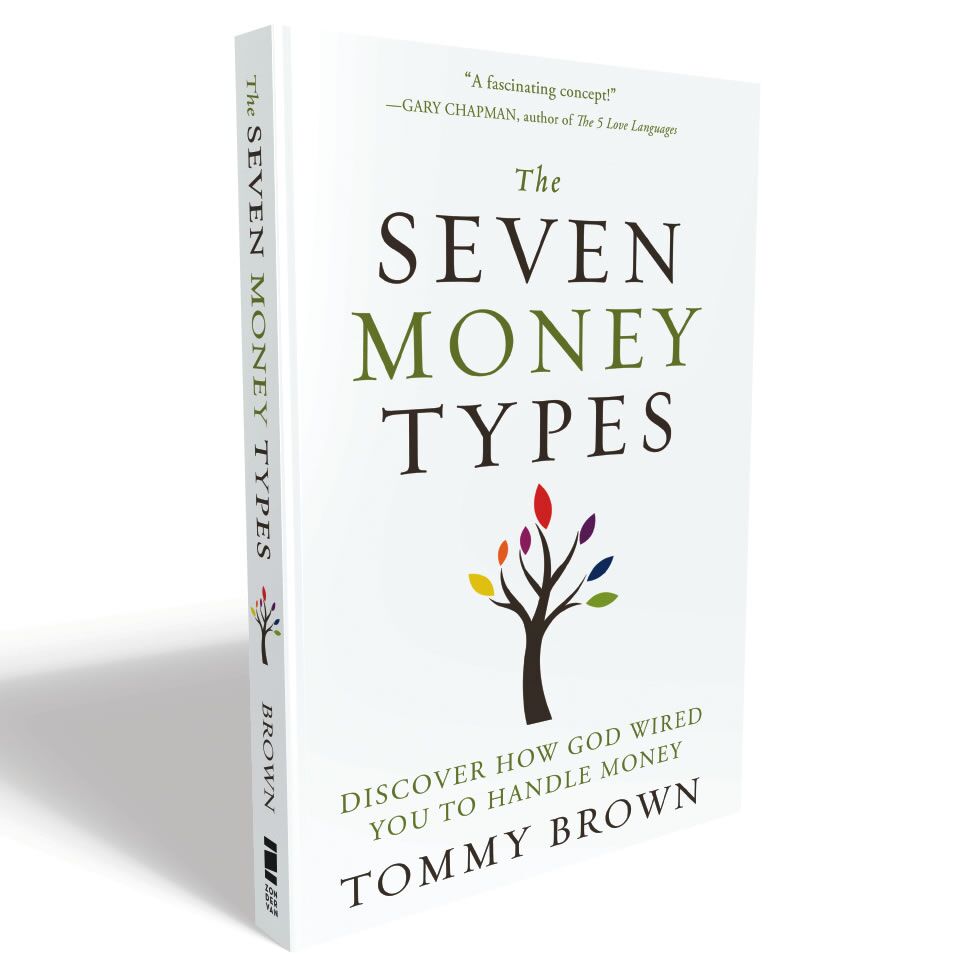In The Seven Money Types, Pastor Tommy Brown leads you on a journey of personal discovery as he reveals the seven money types found in Scripture, helps you identify the type that best fits you by means of a 35-question assessment, and coaches you on understanding, affirming, developing, and enjoying your unique approach to money.
Discovering your money type – whether you are an Abraham (hospitality), an Isaac (discipline), a Jacob (beauty), a Joseph (connection), a Moses (endurance), an Aaron (humility), or a David (leadership) – will bring greater self-awareness, reduce internal financial tension, help you resolve financial conflict with others, and help you grow financially from a faith-based perspective. As you walk with Pastor Brown through the Scriptures you’ll find holistic financial pathways that lead you to a place of increased awareness and confidence related to money.
True financial well-being involves more than getting out of debt and accumulating wealth. It’s about discovering how you’re wired by God, and how that wiring influences the way you think about, feel toward, and handle money.
- Quote: “God uses your relationship to money to bring hope and healing into the world.” (22)
- Quote: “Because none of us is perfect, each one of us is necessary to the human race to give us a clear image of who God is and what life with God can be like.” (24)
- Note: Abraham, Isaac, Jacob, Joseph, Moses, Aaron, and David are biblical characters that served as money types to clarify what it means to be made in God’s image in certain aspects.
- Note: Because we are all made in God’s image, we exhibit one or more of these money types. This is so we can learn to be stewards over the world the Lord has left for us.
- Quote: “Essentially, Abraham types reveal the hospitality of God, the One who desires to care for and comfort his children with special kindness.” (39)
- Quote: “When it comes to money, their first concern is not how far they can stretch a dollar, but rather how they can create pleasurable experiences for others.” (42)
- Note: Know your motivation before you spend. Is it for the love of others or do you feel obliged to do so?
- Note: Even though you want to make sure others get what they want, you must make sure that you voice what you want as well to help others feel included in your life. This is to ensure you are also taking care of yourself.
- Quote: “Isaac types are focused and determined with their finances, seeking to make the most of their resources.” (59)
- Quote: “So eliminating the nonessentials isn’t just about mental discipline. It’s about the emotional discipline necessary to say no to social pressure.” (64)
- Note: Isaac types do not work hard for their own glory. Whether it’s small or large deals, all their work is based on glorifying God so they can help further the kingdom.
- Note: Even though it is great to be looking for the best deals and working on saving every dollar spent, it is also important that you take time to splurge on yourself and be willing to buy something without a coupon.
- Quotes: “Jacob types represent and long for beauty. Whenever they encounter something their hearts desire, they’ll get it, figuring out what it takes to acquire it, sparing no expense of time, energy, or resources in pursuit.” (85)
- Quote: “When Jacob types entrust their lives to God, divine beauty flows through them in breathtaking ways. And whatever a Jacob type touches heightens others people’s awareness of God’s beautiful presence among them.” (92)
- Note: Jacob types can be known to overindulge in themselves and others, causing financial mistakes that will hurt them in the future.
- Note: Jacob types will often struggle with the choice of hospitality or discipline.
- Quote: “The Jewish tradition considers Joseph to be the connector, or even the foundation for the people of Israel, the one who was able to hold things together and preserve their existence during the most trying times.” (107)
- Quote: “Joseph types believe money should be used to forge and strengthen relationships, helping them make needed connections.” (108)
- Note: Joseph types are dreamers. They are always thinking and studying so they can pursue bigger goals and help enrich the lives of those around them.
- Note: Joseph types at times get far too connected in the world and do not take time for them. It’s important they carve out time to work on their relationship with God and time for rest.
- Quote: “Moses was responsible for implementing the commands and processes God provided so the people could endure. Endurance is a key word in Moses’s life — to survive four decades in the wilderness with what we could see as a band of often hard hearted, stiff-necked followers, he’d need endurance, which was only possible with structured resources to make certain Israel’s economy function[ed] well enough that they stayed together and kept progressing toward their collective goal: the Promised Land. Moses had to take the long view with resources if they were to survive. He needed more than a short-term fix; he needed a long-term plan, which God provided.” (134)
- Quote: “A Moses type’s shadow side is perhaps one of the most apparent of any we’ve encountered yet — impatience.”
- Note: The essence of how Moses money types operate is endurance. Endurance is possible by establishing the value of well-ordered financial habits. Organization is established with the intention of providing space for them to not worry excessively about money, but then entrust God to provide the rest.
- Note: The conflict that Moses types run into can be judgment regarding how others handle money and the need to bring about order for themselves. They also struggle through moving things ahead too quickly or assuming more responsibility than is necessary.
- Quote: “The way Aaron handled resources held implications for his own life and the lives of the people of God. Therefore, Aaron handled resources with great care; to misuse or mishandle God’s resource was to jeopardize his and his fellow Israelites’ well-being. Aaron, more than any other money-type character, understood the sanctity of resource management and related to resources with deep humility.” (156-157)
- Quote: “Sometimes, however, taking too much of a hands-off approach to money, or being so inclined to see and support the needs of others, causes their lives to be financially unstable.” (171)
- Note: Aaron types operate under a core value of humility. By humility, serving others is defined. They are understood and recognized by how they are sacrificial with their finances, manifested in trust in provision and care for the here and now before themselves, as well as their compulsion to care for the needs of others/injustice.
- Note: The struggle that Aaron types run into is predominantly instability. This instability can often manifest itself in being too easily persuaded by what others’ wants are and tending to them.
- Quote: “David represents God’s leadership, which does not shrink back from formidable foes, but calls us to stand tall in the face of towering giants, whatever form they take. … He reminded them why their lives mattered, inspired them with confidence, compelled them to act, and aligned resources to achieve desired goals. Resources, in the light of a leader with a vision, and in light of God, take on significance and meaning.” (185-186)
- Quote: “In the extreme, David types can become so focused on what they want — on what they don’t have now and desire in the future — that they run past or over cherished relationships, friends, family, and so on. Because David types are strong future-oriented, they can lose sight of the goodness of life as it is.” (200)
- Note: David types see the big picture and align their resources in order to achieve these ends. They are drawn towards the future and crave to leave a financial legacy for the next generation and have an incredible capacity to provoke a following.
- Note: David types can fall into selfishness by their accelerating rigor. They can get so occupied with where they plan to go that they fail at Kant’s implication of using people as means rather than “ends in themselves.”
- Quote: “The way to financial well-being is a returning home to your deepest sense of self, which is rooted and nurtured in God’s love.” (211)
- Quote: “Because each type brings with it both strengths and growth areas, both light and shadow … you’ll become increasingly aware when you’re experiencing competing thoughts and emotions that arise from the different aspects of God’s image at play within you.” (215)
- Note: Financial well-being does not begin with what is outside of ourselves but rather becoming increasingly aware of our interior lives, and being diligent to tend them.
- Note: We are all responsible to grow in each money type as all participate in the full manifest image of God. But understanding these different facets help us to understand what is going on within the psychology and emotions of others as they are operating within their ordained money-type. We also must embrace our dominant money-type without competition in order to witness God’s image manifest in us and around us according to our money-type.

